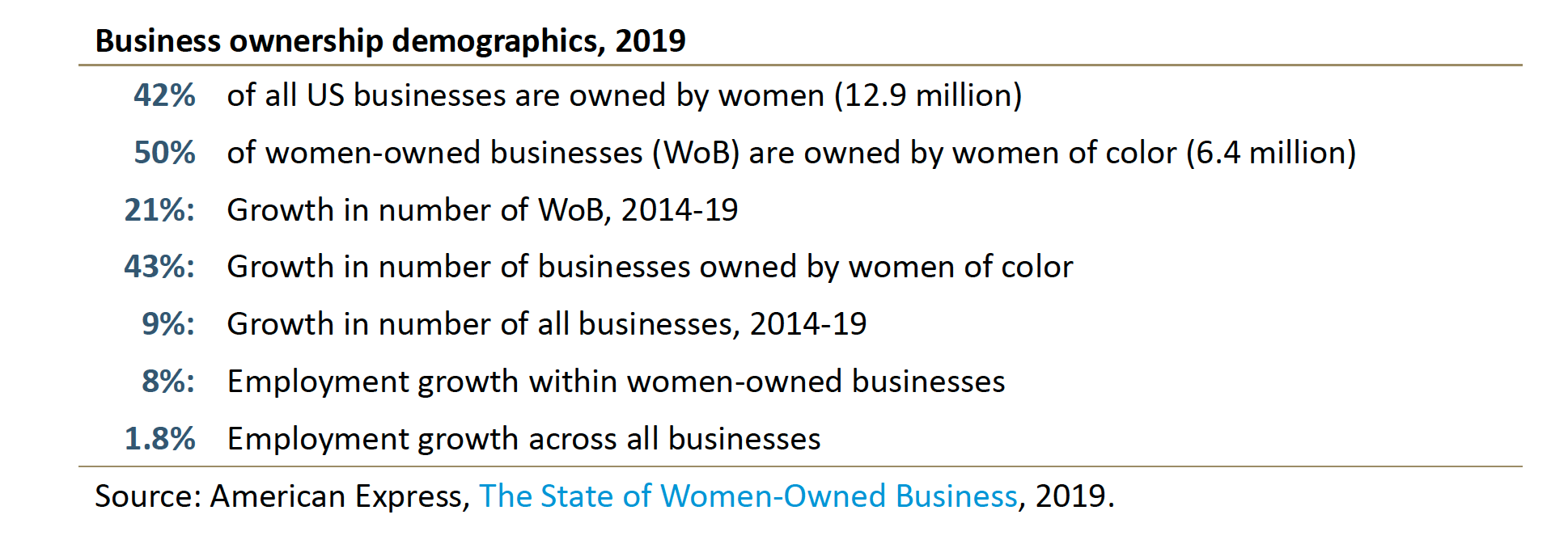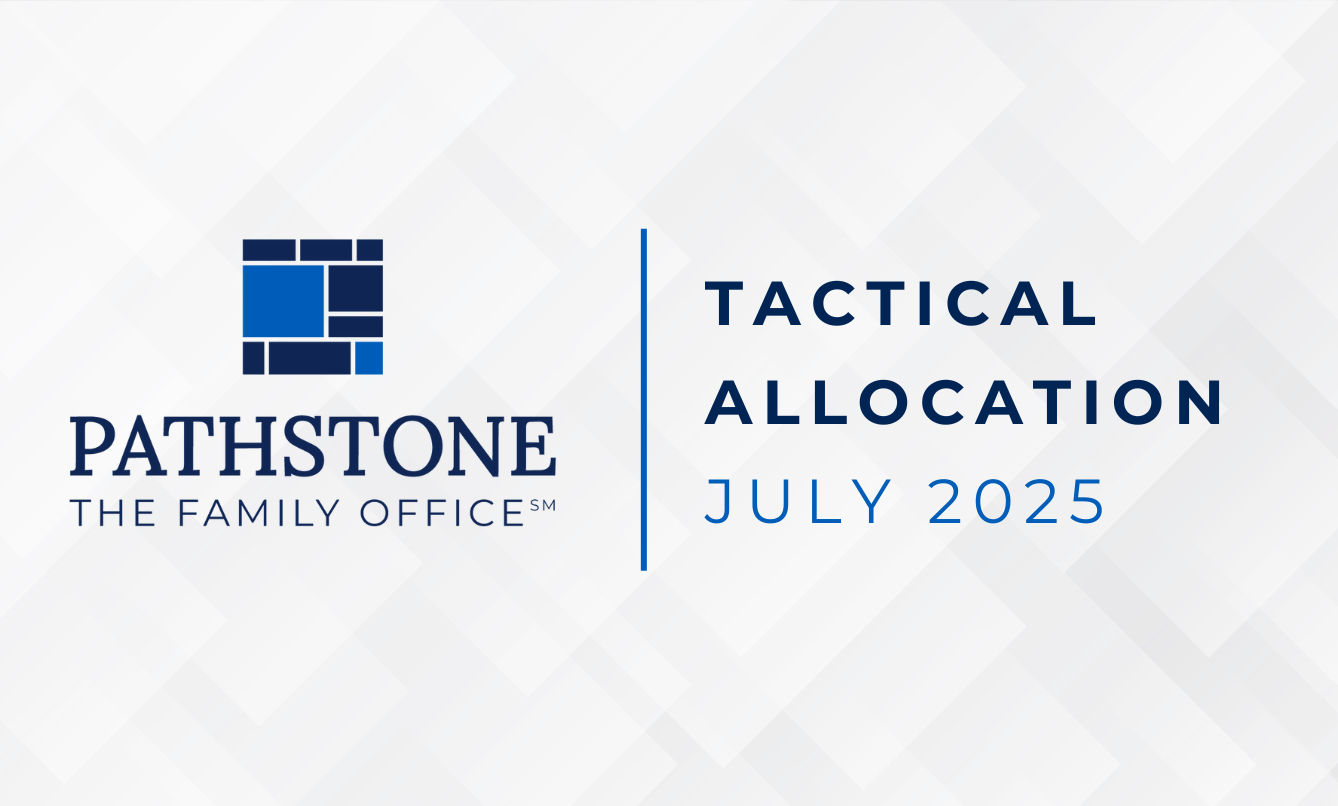By now it’s well understood that entrepreneurship is beneficial to economic growth and development. It has been at the core of every economic recovery in history. The creation of small businesses boosts economic growth by introducing new products, services, and technologies into the economy. Most importantly, it provides new job opportunities, challenges existing firms, and boosts competition and productivity. In this note we consider the role of entrepreneurship in fueling economic growth. In particular, we focus on the need for investors to deploy capital to support women entrepreneurs as we emerge from the Covid-19 recession, given that women-owned businesses in a post-recession environment have been shown to create more jobs. The gap between supply and demand for capital available to women entrepreneurs must be closed.
The backdrop: statistics on women entrepreneurs
Over the past several decades, women have been a fast-growing segment of small business owners, with entrepreneurial women of color representing the fastest-growing cohort of all entrepreneurs. Women-owned businesses were particularly big job creators and stabilizers of the economy following the 2008-09 Great Recession. Nationally, minority- and women-owned business enterprises (MWBEs) added 1.8 million jobs from 2007 to 2012, while firms owned by white males lost 800,000 jobs, and firms equally owned by white men and women lost another 1.6 million jobs. Further, many women-owned businesses focus on sectors such as health care and education, qualifying for consideration as social enterprises, designed for both profit and positive social or environmental impact.

Source — https://about.americanexpress.com/files/doc_library/file/2019-state-of-women-owned-businesses-report.pdf
Small businesses currently suffering
Many small businesses are being challenged or even decimated by the coronavirus crisis. A March 2020 survey by the National Federation of Independent Business (NFIB) indicated that over 90% of small business owners had been negatively impacted by this crisis.[i] About half of small businesses said they could survive two months at best, and about one-third believed they could hang on for three to six months.[ii] In a U.S. Chamber of Commerce Survey conducted April 21-27, 2020, roughly one in three small businesses reported temporarily shutting down in the prior two weeks, up 5% vs. a similar survey in March.[iii]
WEConnect International, a global network that connects women-owned businesses to global market opportunities, conducted a survey in April 2020 of nearly 600 women-owned businesses regarding the impact of Covid-19. More than 85% of those surveyed have been negatively impacted, with 90% experiencing a decrease in sales. Many are adjusting their products or services to changing economic climate and are trying to secure financing so that they can stay in business. On a positive note, women business owners are taking steps to adapt: 54% cut unnecessary expenses; 42% shifted to a digital model; and 37% are growing in response to local or global needs.[iv] [v]
There are reasons for optimism, especially in the medium to long term. According to the Census Bureau, 79% of small businesses that have laid off or furloughed employees anticipate bringing back most of their employees once the U.S. small business climate returns to normal.[vi] Further, more than 500,000 applications for an employer identification number have been submitted since mid-March, an indication of entrepreneurs’ intent to start new businesses soon.[vii]
Crisis fueling innovation
Crises often fuel economic and technological innovation. For example, the 2008-2009 financial crisis led to the development of new business models such as Uber, a ride-sharing platform, and Rent the Runway, an online clothing and accessory rental service. [viii]
Entrepreneurs are already rising to the challenges posed by the coronavirus crisis. For example, liquor distillers are pivoting to make hand sanitizer needed to deter the spread of the virus. Some small companies are seeing soaring demand for innovative products or services. One such example is Farmbox Direct, a subscription service that delivers boxes of fresh produce directly to customers. Ashley Tyrner, Farmbox’s founder, saw a massive increase in orders as the nationwide lockdown took hold. New customers are coming from areas where grocery shelves sit empty, or are setting up deliveries for older relatives who don’t want to risk infection by shopping outside their homes.[ix] Another example is MD Ally, which allows 911 dispatchers and other responders to route nonemergency 911 calls and patients to virtual doctors to help improve the efficiency of emergency response systems. Founded by Shanel Fields in March 2020 just as the US economy was shutting down from the coronavirus crisis, MD Ally is currently hiring while many companies have furloughed or laid off workers. [x]
A compelling analogy: small company performance during the Great Recession
Although businesses owned by women or people of color were more likely to shutter during the Great Recession of 2007-09, they helped stabilize the economy during the subsequent recovery, adding 1.8 million jobs in 2007-12. Meanwhile, firms owned by white males lost 800,000 jobs and firms owned equally by white men and women lost another 1.6 million jobs over this period.[xi]
Some of disparity of experience might be explained by the industries affected. Manufacturing and construction were hit particularly hard during this time — two sectors with a high concentration of white male owners. [xii] Meanwhile, the recovery was largely fueled by growth in industries such as health care and food services, which tend to have more minority and women ownership.[xiii]
The numbers are compelling: Businesses owned by women or people of color were foundational to economic recovery.
Women-owned businesses’ role in recovery
The growth trajectory of women-owned businesses, especially those owned by women of color, suggests that investors who want to 1) support economic recovery overall; 2) support entrepreneurs; 3) support women and people of color; or 4) support social enterprises – or any combination of the above – should consider investment in these businesses as they may offer the potential for both impact and solid investment returns.
Half of women-owned businesses are concentrated in three industries: professional/ scientific/technical services (lawyers, scientific, architects, consultants); health care and social assistance (child day care and home healthcare services), and other services (such as hair/nail salons and pet care)[xiv] Some or all these industries will rebound once the crisis recedes. An opening up of the economy, an aging population and a return to work should revive demand for these types of services and the emerging companies could represent good investment opportunities. Clearly there will be pent up demand for personal services such as hair and nail care. As people go back to work away from home, the need for childcare and other services will rise. Elective surgeries and other non-essential health care services will be in demand again. Finally, as the economy returns to growth, the need for professional services such as legal or consultant expertise will increase.
Across the board, people are increasingly looking at social enterprises, i.e. businesses that are designed to have both a positive purpose and profit, as vehicles for providing solutions to the major social and economic challenges facing communities. By providing social benefits as well as well-paying jobs, social enterprises offer the potential for rebuilding communities that are stronger than they were before the recession. Social enterprises run by women and entrepreneurs of color, who are hardest hit by the economic downturn, understand their target markets especially well and are well positioned to build successful social enterprises while the economy recovers.
The challenge for women entrepreneurs
BCG, a management consulting firm, partnered with MassChallenge, a US-based global network of accelerators, to review five years of investment and revenue data through a gender focused lens. They found that companies started or cofounded by women received on average less than half the amount of investment capital as male founded companies. Typically, women founders receive only a small fraction of venture capital deals (4.4.%) and only about 2% of all capital invested according to pitchbook data in 2016 through early 2018. However, the women-founded and co-founded companies outperformed their peers, generating 10% more cumulative revenue over the five-year period. According to the study, this might be attributable to women operating businesses that they have experience with, such as childcare or personal care (e.g. hair salons). [xv]
Michele Bongiovanni is an entrepreneur and CEO/Founder of HealRWorld LLC, a database platform that measures sustainability and creditworthiness of small and mid-sized enterprises (SMEs) for investors and funders. When asked why she believes women entrepreneurs tend to perform better than men, she opined that women business owners tend to be more collaborative in their management approach and make better financial decisions. This combination, in her opinion, often leads to success for startups. [xvi]
There is some data to back up Ms. Bongiovanni’s statements regarding women as better business owners and managers. FitSmallBusiness.com compiled data from the U.S. Census Bureau, Dow Jones, the Harvard Business Review, and others to compare female entrepreneurs to their male counterparts. The analysis combined 10 private and public studies and determined from the statistics that women business owners outperformed their male counterparts, generating higher revenue, creating more jobs. They also tend to significantly improve startup company performance and have a larger appetite for growth.[xvii] [xviii]
Ms. Bongiovanni notes that funding for SMEs was sorely lacking during the Great Recession. This appears to be the case during the current crisis, as evidenced by the first round of the Paycheck Protection Program (PPP) administered by the Small Business Association (SBA) and facilitated by banks. According to a recent study from ColorofChange, UnidosUS, and Global Strategy Group, close to half of Black and Latinx-owned small businesses expect to close their doors within six months, and may not be able to reopen. A majority (51%) of Black and Latinx small business owners who sought PPP loans asked for under $20,000 in temporary funding from the federal government. Only about 12% received the requested loans. Nearly two-thirds said they either received no funding (41%) or are still waiting to hear whether they will receive any federal help (21%).[xix] [xx] If these businesses can receive funding to get through the recession, they would help the economy pull out of the recession by providing needed jobs and services in local communities, particularly underserved communities.
As the coronavirus continues to wreak havoc on communities and the economy sputters back into gear, it is clear that small businesses, particularly those founded and run by women entrepreneurs, can help pull the economy out of a recession by providing needed products, services, and jobs. Such enterprises may also help communities emerge by filling in gaps in social services no longer provided as effectively by underfunded local governments. Investors can step up and provide needed capital and reap positive returns by supporting these women entrepreneurs.
If you have any questions or would like to learn how to make an impact please contact us.
[i] https://www.nfib.com/content/press-release/economy/covid-19-impact-on-small-business-part-3/
[iii] https://www.uschamber.com/report/small-business-coronavirus-impact-poll?iesrc=ctr
[iv] https://www.weconnectinternational.org/en/media-news/ceo-blog/connecting-in-the-age-of-covid-19
[v] https://www.weconnectinternational.org/images/IndPDFs/COVIDInfographicRev2.pdf
[vi] https://www.uschamber.com/report/special-report-coronavirus-and-small-business
[vii] https://www.nytimes.com/2020/05/20/business/coronavirus-small-business-startup.html
[viii] https://www.entrepreneur.com/article/347669
[ix] https://www.marketplace.org/2020/03/25/some-small-businesses-are-flourishing-during-the-covid-19-pandemic/
[x] https://www.nytimes.com/2020/05/20/business/coronavirus-small-business-startup.html
[xi] http://www.growth-engine.org/news/brookings-businesses-owned-by-women-and-minorities-have-grown-will-covid-19-undo-that/
[xii] https://www.brookings.edu/blog/the-avenue/2020/03/25/what-the-great-recession-can-tell-us-about-the-covid-19-small-business-crisis/
[xiii] https://www.brookings.edu/research/businesses-owned-by-women-and-minorities-have-grown-will-covid-19-undo-that/
[xiv] https://about.americanexpress.com/files/doc_library/file/2019-state-of-women-owned-businesses-report.pdf
[xv] https://www.bcg.com/publications/2018/why-women-owned-startups-are-better-bet.aspx
[xvi] Interview with Michele Bongiovanni, CEO of HealRWorld, LLC
[xvii] https://www.prnewswire.com/news-releases/are-female-entrepreneurs-more-successful-than-males-data-says-yes-300643927.html
[xviii] https://herahub.com/phoenix/celebrate-5-reasons-why-women-entrepreneurs-are-better-than-men/
[xix] https://www.forbes.com/sites/morgansimon/2020/05/22/congress-needs-to-act-before-half-of-the-uss-black–latinx-owned-small-businesses-close/#1e472cb3b242
[xx] https://globalstrategygroup.app.box.com/s/2es493cxqa88381ha6klistcx4ml3tve
Please see the PDF version of this article for important disclosures.








